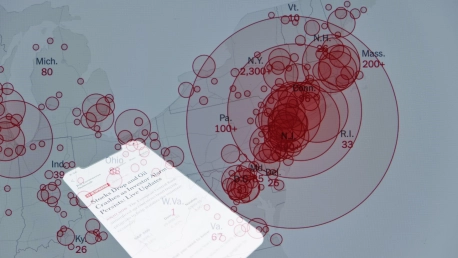As the COVID-19 pandemic continues to spread across the world, the image of the United States seems to be rapidly deteriorating. According to a recent Pew Research Center study, America’s prestige seems to recede, while many nations are criticizing the way the U.S. Government responded to the crisis. In numerous countries, the number of people with a positive view of the U.S. is the lowest in two decades. While many of these people also hold China accountable for the way it handled the situation, the world’s most populous country is seen in a better light than the U.S.
While only 15% of respondents maintained that the U.S. had a good strategy in dealing with the new coronavirus, nearly all appreciated the efforts made by the World Health Organization (WHO) and European Union in connection with the pandemic. It’s important to note that U.S. and U.K. citizens are among the few people that give little credit to their own country for handling the crisis well. With an overwhelming majority of those questioned saying America has controlled the situation poorly, it would be wise to question its role in leading the international response against the virus.
Why is the U.S. Administration Criticized?
With America ranking as the first country in the world in the number of both confirmed SARS-CoV-2 cases and associated deaths, according to Johns Hopkins University, it comes as no surprise that U.S. efforts to stop the spread of the virus seem to be falling short for most of those keeping an eye on the situation. Philanthropist Bill Gates made his own assessment and recently said that the U.S. failed to respond adequately to the COVID-19 crisis. The business magnate is known for his previous efforts to convince policymakers around the world to invest in pandemic preparedness plans.
“It’s unbelievable — the fact that we would be among the worst in the world,” said Gates. He went as far as to point out that the current administration had made not one, but a whole series of mistakes, from testing to issuing guidance to new hires. However, Bill Gates also mentioned that the U.S. government has done a great job with Operation Warp Speed, a strategy designed to deliver 300 million doses of safe and effective COVID-19 vaccines. According to Gates, these efforts will also fall short on the international stage if the U.S. fails to help developing countries acquire the vaccine.
Inequality During the COVID-19 Pandemic
The struggle of erasing world inequality is not new, nor is it easy to solve. Both economic and political strategies are necessary to adjust and ultimately remove inequality, but this is easier said than done during a global crisis. For now, the economic impact of the pandemic is actually reinforcing inequality, according to the Bill & Melinda Gates Foundation’s annual Goalkeepers Report. The study clearly shows that this crisis is bound to have an even greater impact on women, minority communities, and those already experiencing indigence. The report investigates the effects of the COVID-19 pandemic on health, economies, and social issues while urging governments around the world to work together toward a solution.
While the Goalkeepers Report goes on to define the current crisis as a series of “mutually exacerbating catastrophes”, it also shows that vaccine coverage dropped in 2020 to levels last seen in the 1990s. While America is expected to lead the way out of the pandemic and take a dominant position in the fight for worldwide equality, it does have its own problems closer to home. 23 percent of white Americans and 46 percent of Black and Latin Americans previously said they might not afford to pay rent in August, numbers that show just how high inequality is in the U.S. alone.
Global Solidarity or “Vaccine Nationalism”?
Bill Gates said that one of the reasons behind America’s problematic strategy in providing vaccines to everyone in the U.S. administration’s reluctance to support the efforts of developing countries to buy those vaccines. However, the U.S. is not alone in opting for vaccine priority. While EU leaders, the Bill and Melinda Gates Foundation, and Wellcome Trust teamed up for an equitable global strategy, Russia and India opted out of this initiative. As scientists around the world warn against what is now called “vaccine nationalism” during the COVID-19 pandemic, some countries have clearly decided to put their own citizens first when it comes to vaccine distribution.
The new coronavirus crisis has impacted the already marginalized groups in our societies in a way that is by no means fair. While governments everywhere are facing difficult choices every day, it remains crucial for policymakers to address the emerging inequalities generated by the pandemic. The image of the United States seems to be deteriorating, but this does not mean that its role as a leader is over. If anything, people everywhere seem “to still want the U.S. to play a leadership role on the international stage,” according to Dr. Richard Wike, director of the Pew Research Center study.









